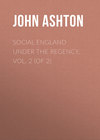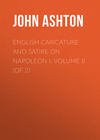Buch lesen: «English Caricature and Satire on Napoleon I. Volume I (of 2)», Seite 8
CHAPTER XXI
PLOTS AGAINST NAPOLEON’S LIFE – THAT OF OCTOBER 10, 1800 – THAT OF DECEMBER 24, 1800 – NUMBER OF PEOPLE KILLED AND INJURED – NAPOLEON’S PORTRAIT
The two plots against Napoleon’s life which occurred in this year must not be forgotten. Let us have Combe’s version, which does not much exaggerate the facts of the cases: —
It seems the Jacobins against
Our hero greatly were incensed:
His levées, drawing-rooms, and so forth,
They look’d upon as deeds of no worth;
The pageantry he held so dear,
Did not Republican appear;
And, at such goings on distrest,
Their indignation they exprest;
Our hero consequently saw
The need of keeping them in awe;
So he contrived a plot, which seems
The masterpiece of all his schemes;
And in this plot, too, he resolved
His greatest foes should be involved.
Fouché pretended, on th’ occasion,
(For Nap allow’d of no evasion)
That some conspirators had got
Daggers and pistols, and what not,
To make the Conqueror their aim,
When from the Opera he came.
Nap to the Opera went indeed,
One gave the signal, as agreed;
Three men were instantly arrested
Three whom great Bonaparte detested.
They got it seems a dagger from one,
But carrying daggers now was common;
He was from Nap at a great distance,
This proof, tho’, was of no assistance;
When the supposed assassination
Had undergone examination,
They seiz’d on others, as directed,
For having such a scheme projected;
One prov’d at home that night he slept,
For being ill, his bed he kept;
All this, however, had no weight,
For Nap’s resentment was too great.
They suffered by the guillotine,
Which was his favourite machine;
Save one, th’ Italian too, I wot,
From whom the dagger had been got,
Nap banish’d him, and with him too,
Th’ Italian patriotic crew;
Four thousand, as historians say,
For no offence were swept away.
The first plot was that of October 10, 1800, and it has, certainly, somewhat of a police ‘get up’ about it. The First Consul knew all about it through an ex chef de bataillon named Harrel, who used to come every night to De Bourrienne, and tell him what the so-called conspirators had done. He supplied Harrel, at Napoleon’s request, with money, &c. Napoleon was never in any danger, and four men perished by the guillotine.
Barre says: ‘Still the persons designed, and arrested, on the very spot of the premeditated murder, were strictly searched about their proper persons, and neighbouring places, and not an arm, nor even a pin, was found. With what, then, could those pretended conspirators commit a murder, since, at the very moment, and on the very spot where it was to have been perpetrated, no kind of arms were found about them?
‘That such was the case, it was asserted, and never denied, in the course of the trial.
‘The only witness was one Harel, an acknowledged spy of the police, holding the rank of Captain.
‘And on the single evidence of a spy, devoted to, and paid by, the police, four men (Arena, Ceracchi, Demerville, and Topino-Lebrun,) were condemned to death…
‘Those unfortunate men having appealed from such iniquitous judgment, as grounded on many erroneous statements, and irregular proceedings, the court of appeals divided, when it was found that eight judges were for repealing, and eight for confirming, the judgment.
‘The division being equal, five more judges were added to the sixteen, when the iniquitous judgment was confirmed.’
The other attempt upon Napoleon’s life was genuine enough. On December 24, 1800, Haydn’s Oratorio of the ‘Creation’ was to be performed at the Opera. He was sleepy, and disinclined to go, but was overpersuaded, and went. Luckily his coachman was drunk, and drove faster than usual. In the Rue St. Nicaise there was a loud explosion, two or three seconds after he had passed the place where it had occurred.
A barrel of gunpowder, surrounded by grapeshot, and pieces of iron, was fixed in a cart, and fired when Napoleon passed. He escaped, but twenty people were killed, and fifty-three wounded, including St. Regent who fired the train. The coachman was so drunk that he drove on, thinking it was only a salute that had been fired. There are several, and contradictory, versions of this event, but this seems to be the most authentic —
For this conspiracy ideal
Was soon succeeded by one real.
While the First Consul, with delight,
Was going to the play one night;
His carriage pass’d a narrow way,
Where an infernal barrel lay —
This barrel of a sudden blew up,
And the combustibles all flew up.
With great dismay was Boney filled,
No wonder – some were hurt and kill’d;
The windows of the carriage broke,
And most tremendous was the smoke:
The coachman luckily enough,
Had taken plenty of strong stuff;
And, not regarding any evil,
Drove thro’ the passage like a devil;
His whip applied when there was need,
And saved his master by his speed.
Had coachee been of drink no lover,
With Nap it would have been all over.
The Jacobins (for, as related,
This party the brave Consul hated,)
Were mark’d for this assassination,
And many suffered transportation.
Indeed our hero firmly swore,
(As he had often done before,
For he would swear thro’ thick and thin),
The British had a hand therein —
It seems the gentleman forgot
John Bull disdains a wicked plot.
Cobbett, of course, improves the occasion.58 ‘Miserable slaves! For an instance of base flattery, surpassing anything we have hitherto seen, take the following from the Chef du Cabinet: “The explosion of the infernal machine broke twenty-nine pictures, out of thirty, which ornamented an apartment in the street of St. Thomas. The single picture which escaped, was that of the Chief Consul. One would be ready to affirm (mark this) that the same God, who watches over the life of the first Consul, protected even his likeness”!!! What Emperor was it that talked of making his horse a Consul? An English blood horse would be disgraced by becoming the successor of Buonaparte.’
And again:59 ‘Buonaparte’s embracing the Parisian addressers, puts us in mind of the good old ceremony of the thief’s kissing the hangman.’
CHAPTER XXII
GENERAL FAST – ADULTERATION, AND COMPULSORY SALE OF STALE BREAD – WAR IN EGYPT – THE BOULOGNE FLOTILLA – NEGOTIATIONS FOR PEACE – RATIFICATION OF PRELIMINARIES – RECEPTION IN ENGLAND – GENERAL REJOICINGS
It is sad to take up the very first number of the ‘London Gazette’ for 1801, and find ‘A Proclamation for a general Fast,’ which was to be held on February 13, the reason wherefore is stated thus: ‘We, taking into Our most serious consideration the heavy Judgments with which Almighty God is pleased to visit the Iniquities of this land, by a grievous Scarcity and Dearth of divers Articles of Sustenance, and Necessaries of Life &c.’
The war bore grievously on the Commons, and, consequently, Napoleon was in like measure abhorred. Nothing short of the thought of approaching famine could have caused Parliament to pass, and the king give his royal assent to,60 ‘An Act to prevent until the Sixth Day of November, One Thousand Eight Hundred and One, and from thence to the End of Six Weeks from the Commencement of the then next Session of Parliament, the manufacturing of any fine Flour from Wheat, or other Grain, and the making of any Bread solely from the fine Flour of Wheat; and to repeal an Act, passed in the Thirty-Sixth Year of the Reign of His present Majesty, for permitting Bakers to make and sell certain Sorts of Bread, and to make more effectual Provision for the same.’ This took effect on January 31, 1801.
‘An Act to prohibit, until the First Day of October, One thousand eight hundred and one, and from thence to the End of Six Weeks next after the then next Session of Parliament, any Person or Persons from selling any Bread which shall not have been baked Twenty-four Hours.’ This Act was 41 Geo. III. cap. 17, and it recites the reason in the preamble: ‘Whereas it is expedient to reduce as much as possible, at the present moment, the consumption of Wheat flour. And whereas it appears a considerable saving would arise if Bread was prohibited from being sold until it had been baked a certain time, &c.’ The penalties of non-compliance ranging from 5s. to 40s.
Here is a receipt given for adulterated bread: ‘Improvement of bread, with economy of flour, and saving of expense: – Take one pound of ground rice, put it in cold water sufficient to cover it, and something more, boil it, and it will absorb all the water, and weigh four pounds; mix four pounds of flour with it, knead them well together, and lighten them with yeast, like common bread, and they will produce ten pounds ten ounces of excellent bread, which will not cost more than twopence halfpenny per pound, and will save one half in the consumption of flour. N.B. this bread will keep moist a week.’
When we remember that bad bread was on January 1, 1801, 1s. 9¼d. per quartern loaf, on March 5, 1s. 10½d., and although it dropped after harvest as low as 10¼d., yet closed December 31 at 1s. 0¼d., and that this bad bread had to be eaten stale, all through Boney, we cannot wonder that the people did not love him. His direct presence was brought home to all and every one daily, by means of that most susceptible bodily organ, the stomach. It was hitting John Bull in a very vulnerable part.
The war in Egypt still kept on, and in February reinforcements of 15,330 men, under the command of Sir Ralph Abercrombie, set sail in a fleet of 175 vessels or ships. In March they defeated the French under Menon, the renegade, but at the cost of the life of the brave Abercrombie.
On April 19, Rosetta surrendered to our forces, and on June 27 Cairo capitulated, on condition that General Belliard, with all his troops, arms, and baggage, should be taken back to France. On their march back to the coast, Menon, finding his cause hopeless, surrendered on the same terms, and thus ended the French occupation of Egypt.
With Napoleon’s concordat with the Pope we have nothing to do, except that his satirists here did not forget to contrast his attendance at the solemn Te Deum at Notre Dame with his pseudo-Mahometanism in Egypt. What more affected us, was the arming along the Channel coast, and the Flotilla at Boulogne, which was to act as transport for the army for the invasion of England. The French themselves laughed at these little cockle-shells of boats, teste Madame Junot: —
‘Boulogne was designated from the year 1801, as the chief station of the enterprise against England. The greatest activity suddenly prevailed in all ports of the Channel; camps were formed on the coast, divisions of light vessels were organised, and multitudes were built. The Flotilla, as it was called, created apparently with the greatest exertion, and all the apparatus of preparation, spread, as was intended, alarm on the opposite shore. The Boulogne Flotilla was composed of extremely light boats, so small, that at Paris, where everything forms the subject of a jest, they were called walnut shells. Brunet, who at this time was a truly comic actor, performing in some piece which I do not remember, was eating walnuts, the shells of which, after a little preparation, he launched upon some water in a tub by his side. “What are you doing?” said his fellow actor. “Making des péniches,” replied Brunet. This was the name by which the flat-bottomed boats of the flotilla were known at Paris. But poor Brunet was made to atone by twenty-four hours’ imprisonment for his unseasonble joke on the Government; and the day after his release the same piece was performed. When Brunet should have made the interdicted reply, he was silent. The other actor repeated the inquiry as to what he was doing. Still Brunet made no answer, and the other with an air of impatience proceeded: “Perhaps you do not know what you are about?” “Oh yes!” said Brunet, “I know very well what I am about, but I know better than to tell.” The laugh was general, and so were the applauses; and, in truth, nothing could be more droll than the manner in which this was uttered; Brunet’s countenance in saying it was of itself sufficient to provoke universal hilarity.’
But, in very truth, John Bull was not much frightened: there was Nelson, and his fleet, and people had great faith in them. But Nelson could do little against this passive fleet. On August 3 he bombarded Boulogne, sunk five gunboats, and damaged others; and on the 15th of the same month he tried to capture, or destroy, these gunboats, but was unsuccessful in his attempt, as the French had chained them to the shore.
We now come to the principal event of the year, the Peace – over which there was much coquetting. As early as March, Lord Hawkesbury, the then Secretary of State for Foreign Affairs, addressed a letter to M. Otto, signifying King George’s desire to enter into negotiations for the restoration of peace.
These negotiations for peace were naturally noticed, and one very good etching, by Roberts, ‘Negotiation See Saw,’ shows Napoleon and John Bull engaged in that pastime seated on a plank ‘Peace or War.’ Bonaparte says, ‘There Johnny, now I’m down, and you are up – then I go up and you go down Johnny – so we go on.’ John Bull does not enjoy the situation so much, but grumbles, ‘I wish you would settle it one way or other, for if you keep bumping me up and down in this manner I shall be ruined in Diachilem Plaster.’
A somewhat elaborate etching, also by Roberts (no date, 1801), depicts ‘John Bull’s Prayer to Peace, or the flight of Discord.’ He is on his knees praying the following to Peace: ‘Sublime Descendant of Happiness, incline thine ear to the Petition of thy poor Patient, worn out oppressed I. Bull, who humbly prayeth thee that thou would’st in the first place exert thy influence, and be the means of restoring to me again those lost Liberties and Privileges I have been so basely rob’d of, and that you would’st be pleased also to put a speedy stop to cruel monopolizing, and e’er it be long, send me thy attendant Plenty, to comfort me and my long suffering numerous Family, and may that horrid Demon Discord never return again.’ Peace, whom the eye of Providence watches over, replies: ‘Thy Prayer shall be fulfill’d, Plenty awaits thee with all her blessings, her pace is slow but sure.’ Bonaparte and Pitt, who is represented as covered with serpents, are retreating.
On October 1, preliminary articles of peace with France were signed at Lord Hawkesbury’s office at Downing Street, by his Lordship, and M. Otto on the part of the French Government, and great were the rejoicings at the event, although not so great as they might have been. The ‘Times’ of October 3 says: ‘The public were so impatient to express their feelings on the occasion of the News of the Preliminaries of Peace being signed, that almost all the public streets were illuminated last night. This was evidently not the wish of the Government, who have deferred a general illumination until the ratification of them comes back from France. Accordingly, none of the Public Offices were illuminated, nor either of the Theatres. The ratification of the Preliminaries is expected from Paris on Tuesday next.’
No wonder ‘the public were so impatient to express their feelings,’ their joy must have been so great. Long-suffering, they had borne the burden and heat of a long war, cheerfully too, and gladly must they have welcomed its conclusion.
In Paris the joy was the same. The ‘Times,’ October 10, says: ‘The Intelligence … was announced to the inhabitants of Paris by discharges of Artillery, and was proclaimed by torch light throughout the streets. At night there was a general illumination. Never was joy more fervently expressed.’
One of the most practical tests of renewed confidence was the great variation of 3 per cent. Consols – in September 58¼; in October 69½.
On October 10 came the preliminaries, ratified. Let us see the ‘Times’’ account: – ‘London October 12th. On Saturday morning, at ten o’clock, General Daurostan,61 Chef de Brigade in the Artillery, and Aide de Camp to General Bonaparte, arrived at M. Otto’s house in Hereford Street, with the ratification of the French Government of the Preliminaries of Peace signed on the 1st inst. between Lord Hawkesbury and M. Otto in Downing Street.
‘The Preliminaries were ratified in Paris on the 5th; but General Daurostan was not dispatched till Wednesday evening, in order to give time for a magnificent gold box to be made, in which the ratification was enclosed to Lord Hawkesbury. The General was also delayed by his carriage breaking down upon the road.
‘After breakfasting at M. Otto’s, the General, accompanied by the Minister, and Mr. St. John (Mrs. Otto’s brother), proceeded to Reddish’s Hotel, in St. James’s Street, where he dressed, and afterwards went to Downing Street. On their way thither, the populace took the horses from the carriage, and drew it through the principal streets. As soon as the Ratifications had been exchanged, Lord Hawkesbury sent a letter to the Lord Mayor… General Daurostan cannot fail to communicate to his Court the very flattering manner in which he had been received in London. His carriage having been drawn to St. James’s Street, he alighted and came forward to the window, and bowed to the populace. On his way to Downing Street, they drew his carriage through the Park. Lord St. Vincent happening to be at the garden-gate of the Admiralty, the mob gave the gallant Admiral three hearty cheers, who, in return, recommended them to take care of the strangers, and not to overturn the carriage… It is understood that there will be another illumination this evening. The Bank and Post Office have given notice of their intending to do so.’
Cobbett foamed at the mouth over this Peace, and his utterances are so caustic as to be well worth reproduction.62 ‘We request our readers to observe, that henceforth we shall be very particular in what we say about the most illustrious Sovereign Consul Buonaparte. Oh! how we shall extol him! We shall endeavour to give our readers the earliest information, when he rises, breakfasts, dines, sups, and spits. With all reverence, we shall treat of his lovely, chaste, and bonny Queen – thus by way of a touch:
‘It is with superlative pleasure we inform our readers, that the last news from France represents the health of the First Consul to be improving. This glory of the world, is returned to his country palace at Malmaison.
But it was after October 10, when the Ratification had arrived, that Cobbett’s wrath boiled over, and he appears at his finest. In the number for October 12, he gives vent to his impassioned feelings in words like these:63 ‘On Saturday last, such a scene was exhibited in this metropolis, as we never expected to have lived to witness, and having witnessed it, we care not how soon we resign our existence! … a vile degraded rabble, miscalled Britons, took the horses out of the carriage which contained the two French Citizens, Otto and Lauriston – the latter of whom they mistook for the brother of Buonaparte – and dragged it from Oxford Street to Downing Street; then back through the Park, and, not content with taking the usual carriage road, dragged it through the Mall, a place appropriated, exclusively, as a carriage road, to the use of the Royal Family!!!’
But Cobbett had good reason to be sore, for the mob had smashed the windows of his dwelling-house in Pall Mall, and at his office in Southampton Street, because he would not illuminate; so he takes his revenge in a peculiar manner. ‘He did not know that there existed in the country, any force whatever, to compel his Majesty’s subjects to exhibit, at night, manifestations of joy at an event which, in the morning, he had stated his reasons for believing to be a subject of deep concern. But he has unfortunately found himself mistaken; and he is, therefore, under the necessity of apprizing his readers, that, until the principles of the British Constitution, and the laws of the realm, which have ever been objects of his fervent admiration, and most zealous support, can rise superior to the destructive rage of a senseless and infuriate rabble; until he can derive that protection from the Police of the Country, which every subject has a right to claim, but which he has, hitherto, been unable to obtain; until, in short, that “tumult of exultation,” and that “delirium of joy,” which a Ministerial writer so emphatically described, and so earnestly wished, might increase, shall have subsided, the publication of The Porcupine will cease, and the mob be left to exercise their vengeance on an empty office.’
But he did not long leave the populace thirsting for his utterances, for the paper was resumed on October 15.
At length all parties pleased to yield,
A treaty was in London seal’d;
And Nap with pleasure had to say
That England own’d his Cons’lar sway.
The Royalists were vex’d at this,
They took the treaty much amiss;
It seem’d (as for a time it was)
Destructive of the Bourbon cause.
This Amiens treaty, as ’twas termed
Was in October month confirm’d;
And London, tho’ so ill repaid,
Illuminations grand display’d.




















